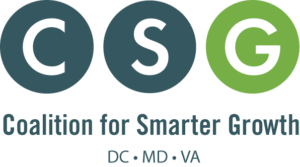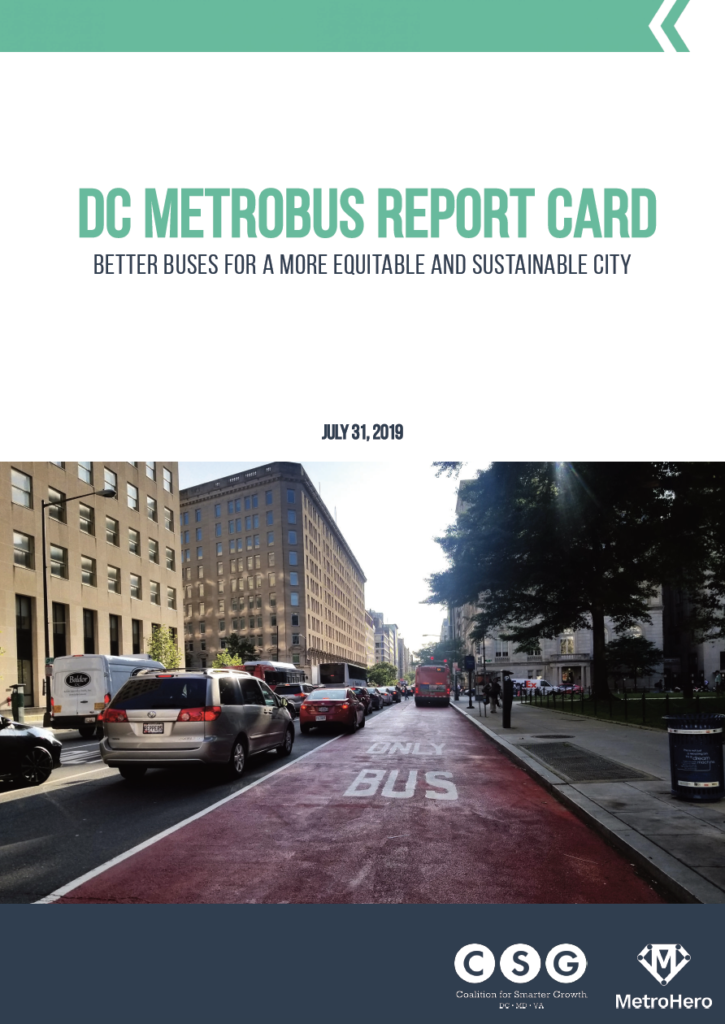
Press Release
For immediate release: July 25, 2019
Contact: Stewart Schwartz, 703-599-6437
Coalition calls on DC area leaders to transform the bus
Washington DC: Bus services in the DC region carry 621,000 riders per day, almost as many as Metrorail. Yet, bus service is in trouble as buses are slowed by road congestion, competition from services like Uber and Lyft (which are adding to that congestion), and are seeing declining ridership. These are key concerns highlighted in the WMATA Bus Transformation Study being briefed to the WMATA board today. The Coalition for Smarter Growth (CSG) served on the study Executive Committee with leading business executives, a union representative and two other non-profit leaders. The study also included strategic and technical advisory committees comprised of government staff and advocates.
“CSG recently teamed with MetroHero on our own study of DC bus performance and confirmed the concerns in the Bus Transformation Study – buses were moving slower and becoming less reliable, scoring a ‘D’ on in our analysis,” said Cheryl Cort, Policy Director for the Coalition for Smarter Growth.
“The public is strongly supportive of better bus service,” said Stewart Schwartz, CSG’s Executive Director. “The most recent survey by the Bus Transformation Study of 2905 area residents and riders found that people overwhelming want to see dedicated bus lanes, more frequent service, free transfers from bus to rail, and more affordable fares.”
“We’ve always known what makes bus service effective – fast, frequent, reliable service, with affordable fares, good user information and safe, comfortable conditions at bus stops and on buses,” said Cheryl Cort. “The recommendations in our DC Bus Report Card, in the Bus Transformation Study, and the Greater Washington Partnership’s bus study, and WMATA’s 2018 study, all point to these same priorities.”
Recent press has highlighted some of the negative reactions by local and state jurisdictions to ideas in the Bus Transformation Study regarding potentially shifting some more local routes and service to the jurisdictions from WMATA. The jurisdictions, many of which have established their own bus systems over the years, expressed concerns about taking on the routes and the potential costs. However, they also generally supported the service improvement recommendations in the report.
“We urge the jurisdictions and WMATA not to get tied up in a fight over who runs which routes. Riders and potential riders want them to focus on service – how to make the buses faster, frequent, more reliable, easier to use, and more affordable for lower income residents,” said Schwartz. “Rather than arguing over who should run what, we need leadership that makes bus transformation a top regional priority.”
“We cannot address our region’s traffic challenges, improve access to jobs, or fight climate change, unless we make bus the mode of choice across wide swaths of our region. Rail and bus transit must be tied to compact, walkable, mixed-use, mixed-income development as much as possible if we are to address these challenges,” said Cort.
The study has six main elements with 27 recommendations. Three main customer facing elements are:
- Bus system should be customer-focused and an easy-to-use option that people want to ride
- Recommendations include marketing, better bus information including maps and bus route naming, mobile apps, free transfers, lower fares, and more employers offering transit benefits.
- Prioritizing buses on major roads is the fiscally responsible way to move the most people quickly and reliably.
- Recommendations include commitments by jurisdictions to giving buses priority, enforcement of priority lanes, and parking limits to provide for bus lanes.
- Frequent and convenient bus service is fundamental to accessing opportunity, building and equitable region, and ensuring high quality of life
- Recommendations include bus network redesign
The Coalition for Smarter Growth will be partnering with other advocacy organizations and business leaders in urging local leaders to follow-up release of the Bus Transformation report with concrete actions to dramatically improve bus service.
___________
The Coalition for Smarter Growth is the leading organization in the Washington DC region dedicated to making the case for smart growth. Our mission is to promote walkable, inclusive, and transit-oriented communities, and the land use and transportation policies and investments needed to make those communities flourish.
###



